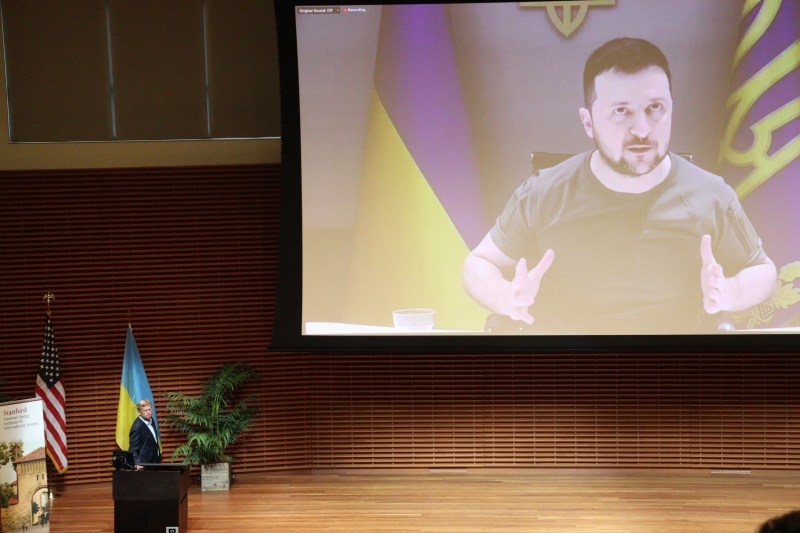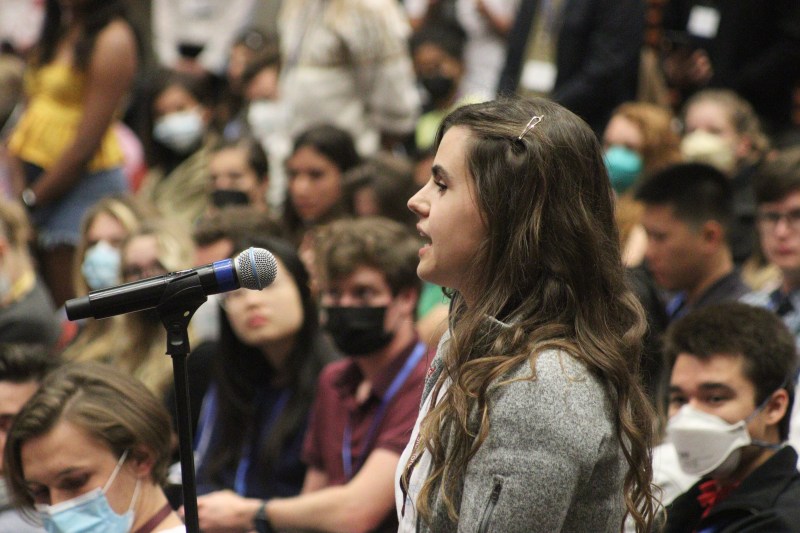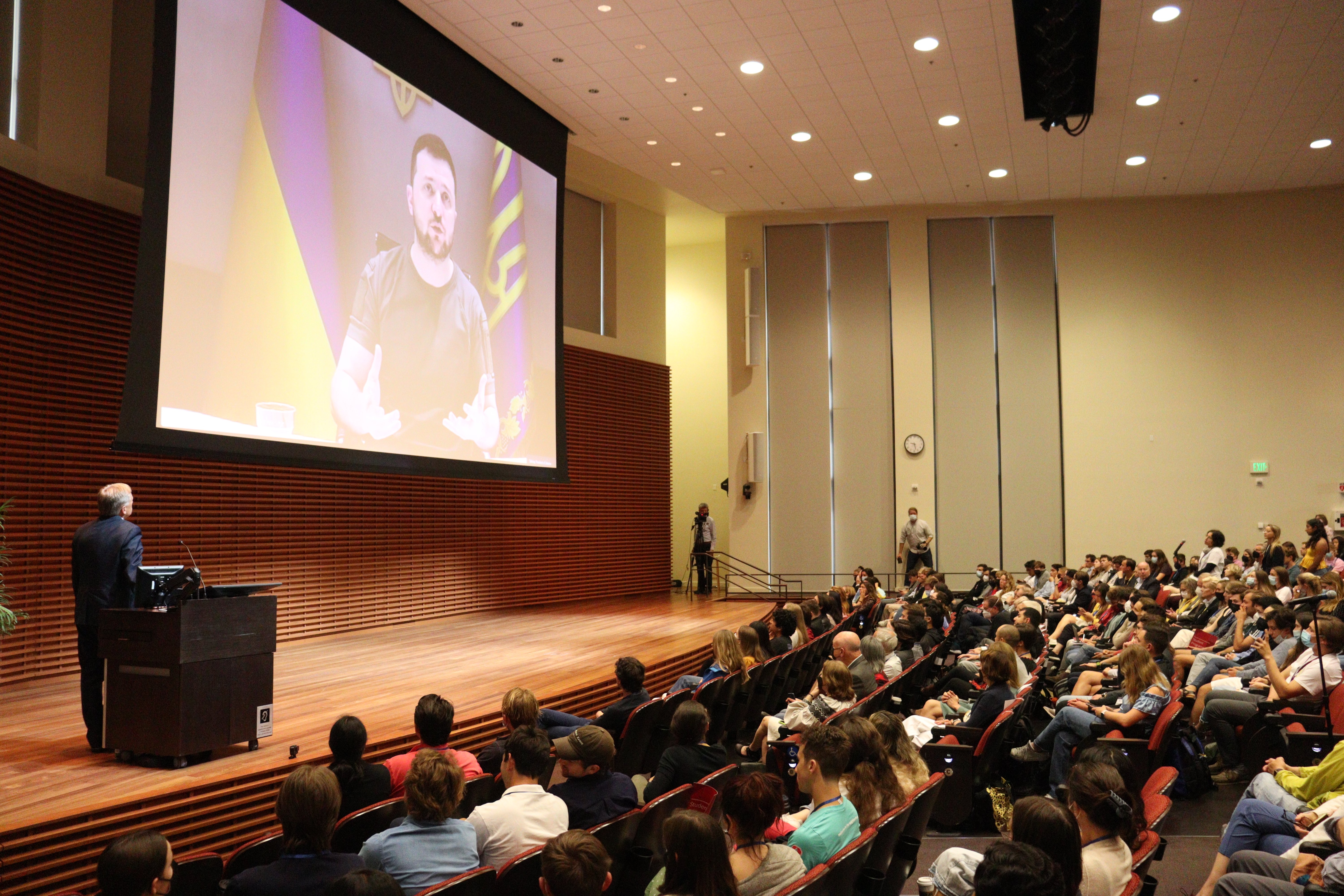Ukrainian President Volodymyr Zelenskyy called on the Stanford community to spread truth with conviction and aid Ukrainian rebuilding efforts in a video address at CEMEX auditorium hosted by the Freeman Spogli Institute for International Studies (FSI) on Friday.
The president, who is leading his country in war with Russia, joined Stanford as part of a recent effort to engage with university students across the United States. During the address, Zelenskyy highlighted the importance of international sanctions, support and involvement of Ukrainian stakeholders in aiding Ukraine. Zelenskyy also answered a series of questions from some of the hundreds of students and community members who gathered at the auditorium.
Welcomed by a standing ovation from the audience, Zelenskyy opened the event by referencing the Stanford application essay question — “What matters most to you, and why?” For Ukrainians, he said, the answer is defined by the war.

“I am answering the [essay] question for longer than these 93 days,” Zelenskyy told the audience via a translator. “I am trying to give my country everything necessary to defend our freedom, and finally win.”
The president’s answer was pragmatic: more weaponry, sanctions, financial support to rebuild Ukraine, a tribunal for Russian war crimes, new international safety guarantees and a complete return to peace.
Expanding the question to Ukrainians, the president applauded the resilience and hope of his citizens. He told a story of a little boy evacuated from Mariupol, a city overrun by Russian forces. After evacuation, the boy invited his rescuers to his home next summer, saying “there is no town, but the sea is still there.”
“This story is about life,” Zelenskyy said. “Life always winning over death and that matters the most for everyone.”
This is not the first time the president has visited Stanford — Zelenskyy came to campus in September under vastly different circumstances. Then, his message was “everything is possible in Ukraine.” He encouraged the audience to actualize this sentiment by helping rebuild Ukraine in “the biggest project on defending freedom that your generation can partake in.”
Emphasizing the strong emotional connection between Ukrainians and Americans, he offered his condolences on the recent school shooting in Uvalde, Texas that killed 19 elementary school children and two teachers. “In these terrible times when American people express their condolences because of death in Ukraine at war, we express our condolences because of death in peace,” he said.
Students had the opportunity to ask questions after the address in a Q&A moderated by FSI director and former U.S. Ambassador to Russia Michael McFaul ’86 M.A. ’86. The president’s answers covered topics from grassroots activism to advice for Stanford students.

When asked by The Daily about the most relevant ways for Americans and Ukrainians abroad to engage in activism, Zelenskyy emphasized the importance of communication and shedding light on the realities of war thousands of miles away.
“To be helped, we have to be listened to and heard,” Zelenskyy said. “This is the most important thing, for the people to know the truth of the ongoing war.”
Zelenskyy offered a similar sentiment in response to a question from Russian student Olga Chumanskaya MBA ’23 about how to promote democratic values and help Ukrainians. Reaching her home community on social media is imperative to break the information bubble, he said, “because they do not read me anymore, I am sure.”
“You see the truth, you get the knowledge from the United States,” Zelenskyy said. “You can demonstrate the world which is bigger than Russia, which is bigger than Ukraine and any country for that matter. And we have to remove the frontiers, open the border and bring the truth in with knowledge, with conviction and persuasion.”
Co-founder of TeleHelp Ukraine Solomiia Savchuk M.D. ’24 asked the President what could be done to support access to healthcare both during the war and after the conflict. Targeted programs for assistance are necessary now, he said, but help is also needed in supporting psychological rehabilitation from the war, especially for Ukrainians in other countries who feel uncomfortable seeing doctors in a foreign country.

Zelenskyy addressed the impact of the current economic sanctions by the United States, the EU and other global allies against Russia. “Sanctions are a weapon that does not involve the taking of lives,” he said. “They simply show that you should not violate international law and you should not violate human rights.”
Kateryna Sliunkova MBA ’22 asked the final question of the event: what advice would the President give to his 20-year-old self? After joking with the audience about his “still young” age (the President is 44 years old), Zelenskyy drew a contrast between students who are studying in universities and some young Ukrainians who stand in lines to get drafted. He emphasized the privilege of the college experience.
“Not all of them will see a chance to write a thesis, and not all of them will stay alive,” he said. “That’s why I would like to wish to all the students a long and interesting life … Receive some sort of pleasure in the lectures or after the lectures, but you have to enjoy your life.”
